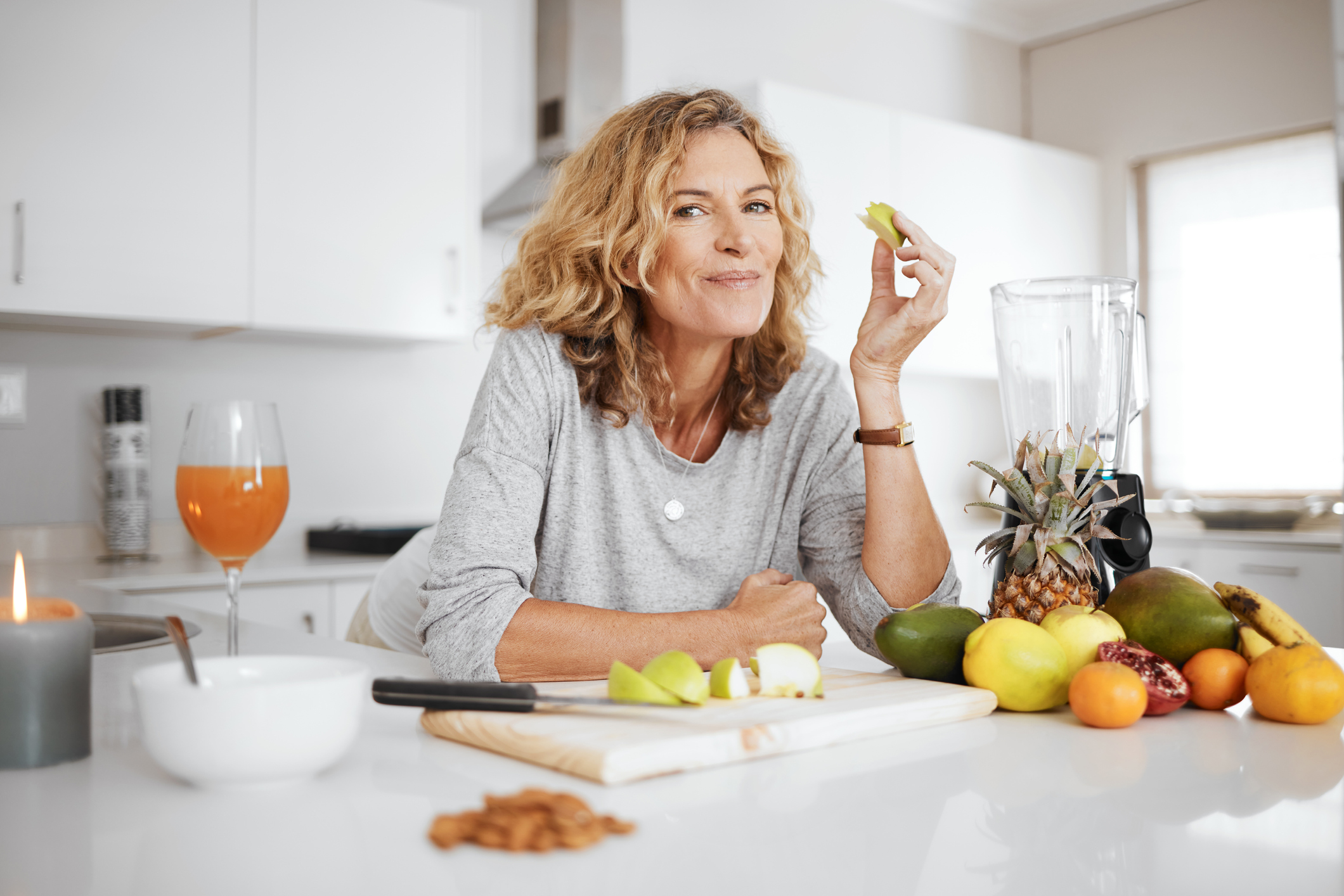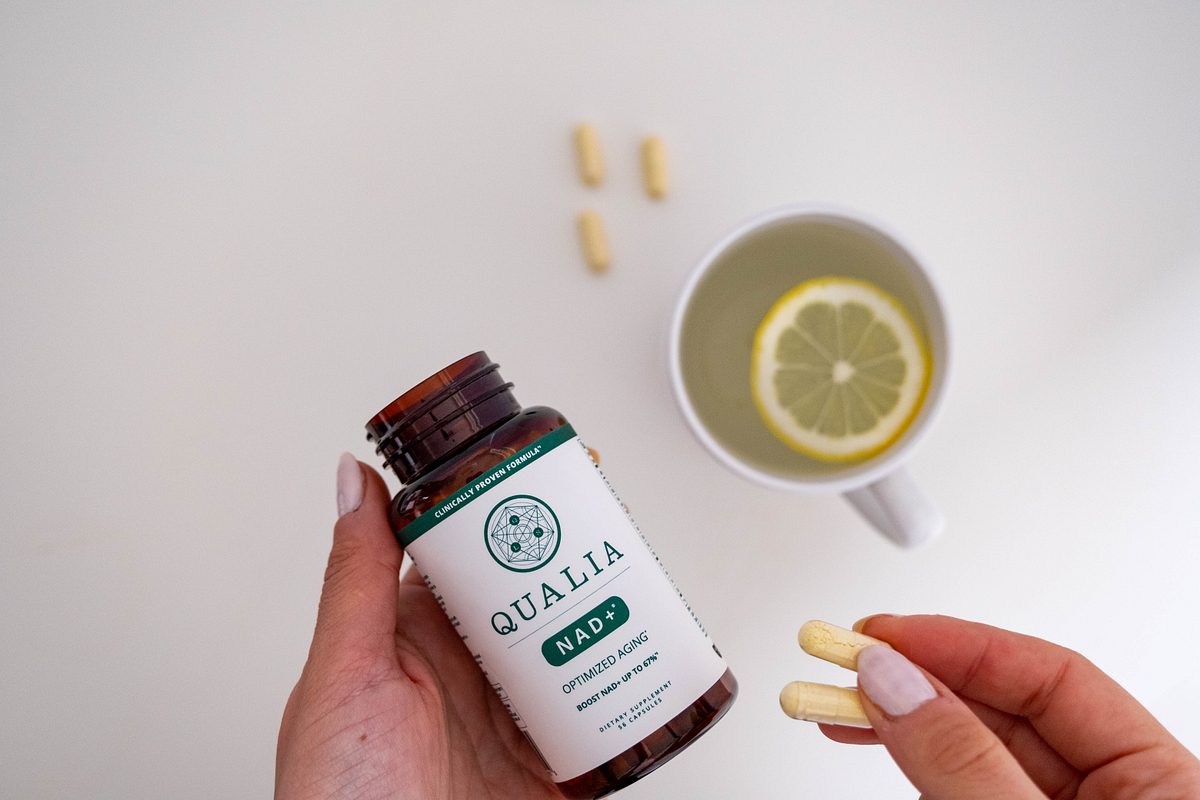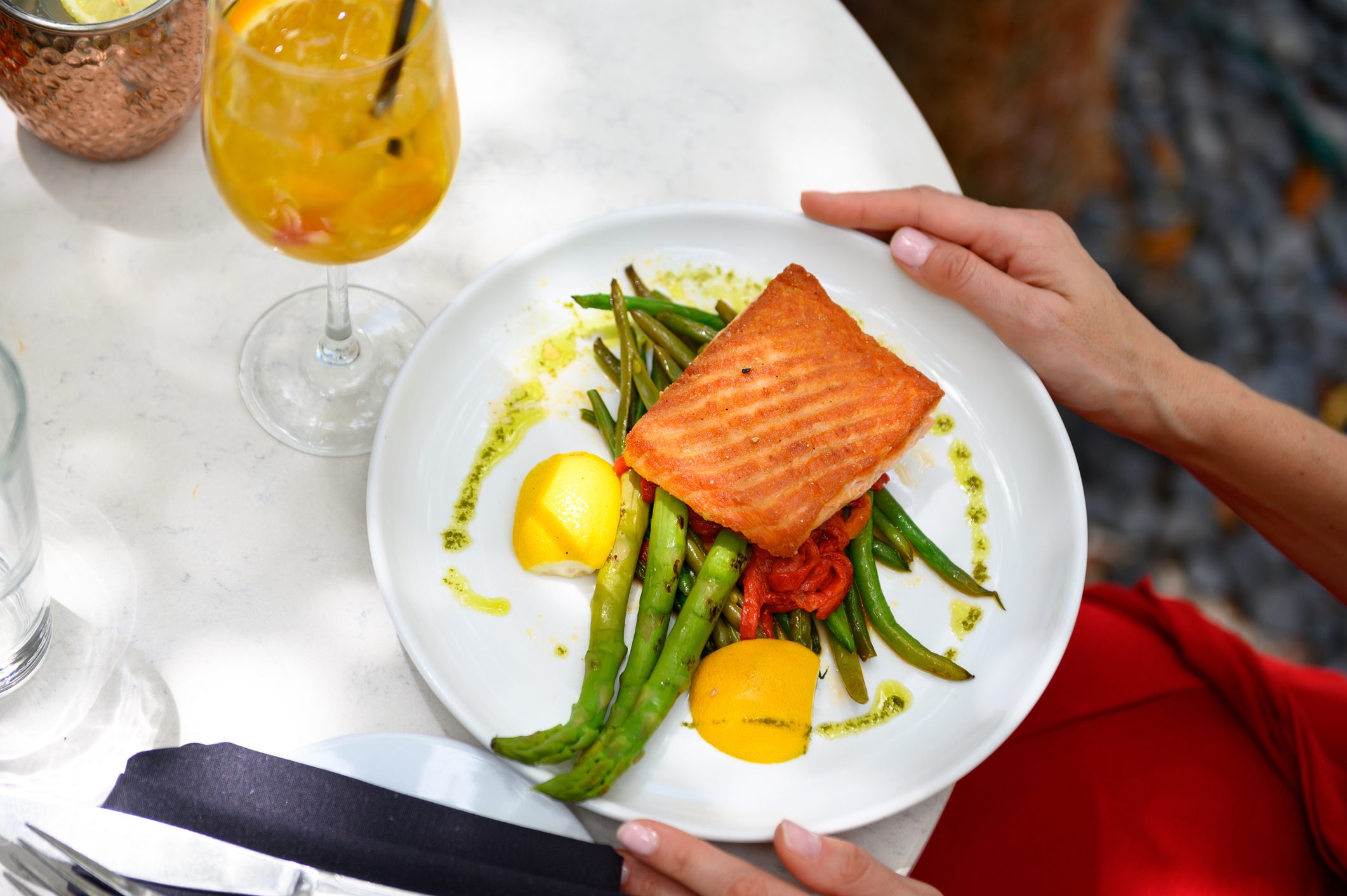Healthy skin starts somewhere that you may not initially suspect: in your gut. Your gut microbiome determines whether you have healthy, glowing skin or you’re prone to skin problems like acne and wrinkles.1
“Poor health within the gut starves the skin of the nutrients it needs to thrive; it causes an increase of inflammatory molecules in the body that directly and indirectly attack the skin, which causes faster aging and aggravates inflammatory skin conditions, such as acne and rosacea,” says Nigma Talib, ND, in Younger Skin Starts in the Gut. “An imbalanced or unhealthy gut can also affect many of the hormones in the body, which again has an effect on the skin.”
What you eat matters for healthy skin (and by extension, a healthy gut). Sugary, processed foods create havoc, but food intolerance is another massive offender.
Long before I wrote The Virgin Diet, I saw how dairy can lead to acne and other skin problems. Much as I loved my foamy cappuccino, I knew that it wasn’t doing my skin any favors. Indeed, research confirms that dairy intake—especially milk—is especially notorious for creating skin issues.2
To be fair, dairy isn’t the only culprit. Gluten, soy, and other food intolerances can also lead to numerous skin issues, including rashes, rosacea, acne, eczema, and psoriasis. When you pull these foods and allow your gut to heal, your skin improves too.
Learn more about the gut-skin connection in this episode of Ask the Health Expert.
What goes on the end of your fork is the best place to start healing your gut and creating model-worthy skin. To do that, focus on foods that provide skin-supportive nutrition. These vitamins, minerals, and other nutrients can help prevent wrinkles, blemishes, and other problems while maintaining the skin’s healthy structure and integrity.
Even the healthiest diet may not provide enough critical nutrients for glowing skin. We’ve combined all the essentials in one easy-to-take packet with our Daily Essentials Multi + Omegas. Every packet combines a high-potency multivitamin-multimineral, concentrated phytonutrients, and anti-inflammatory omega-3 fatty acids. Order yours here.
Read on to learn the top nutrients—along with the best foods that provide them—to support healthy, glowing skin.
The Best Foods & Nutrients for Glowing Skin
Vitamin A
This fat-soluble antioxidant is essential to maintaining healthy skin and hair.3 Vitamin A comes in two forms: fully formed vitamin A (found in animal foods) and carotenoids including beta-carotene, which is a precursor to vitamin A and found in plant foods.4
Best Foods for Vitamin A & Beta-Carotene
- Wild-caught salmon
- Sweet potatoes
- Spinach
- Kale
- Butternut squash
B Vitamins
When your blood sugar spikes, so does a deadly, low-grade type of inflammation called chronic inflammation. Read more about chronic inflammation in this Medium article.
Your body also releases more of an oily substance called sebum. Both chronic inflammation and excess sebum can contribute to skin problems, including acne.5
Watch this video to learn 5 tips for blood sugar control.
B vitamins help maintain healthy blood sugar levels. Vitamin B6 is a cofactor for approximately 150 reactions, including the metabolism of sugar and dietary fat.6 The B vitamin biotin, on the other hand, is essential for healthy skin, hair, and nails.7
Best Foods for Vitamin B6
- Wild-caught fish (especially tuna and salmon)
- Pasture-raised chicken
- Pasture-raised pork
- Grass-fed/ grass-finished beef
- Sweet potatoes
Best Foods for Biotin
- Egg yolks (if you aren’t intolerant)
- Legumes
- Almonds
- Sweet potatoes
- Mushrooms
Vitamin C
Vitamin C helps synthesize collagen, the body’s most abundant protein.8 About 75% of your skin consists of this structural protein.
After around the age 30, your collagen production declines about 1% every year.9 As a result, wrinkles, fine lines, sagging, and other deteriorating conditions characteristic of aging skin begin to occur.
Vitamin C can help. Research shows that optimal intake of this water-soluble vitamin can support skin health in several ways, including promoting collagen synthesis and offering antioxidant protection against UV-induced damage.10
Best Foods for Vitamin C
- Strawberries
- Oranges
- Bell peppers
- Tomatoes
- Cruciferous veggies (including broccoli and Brussels sprouts)
Vitamin D
Your sebaceous glands secrete oils to keep your skin moist. When those glands get clogged, skin problems including pimples, cysts, and acne can result.11 These oils depend on having enough vitamin D.12
Research shows that deficiencies in this fat-soluble vitamin can contribute to many dermatological diseases, including skin cancer, psoriasis, autoimmune skin disorders (like vitiligo), atopic dermatitis, acne, hair loss, and infections.13
Best Foods for Vitamin D
- Wild-caught herring
- Wild-caught salmon
- Wild-caught sardines
- Egg yolks (if you aren’t intolerant)
- Mushrooms
Along with skin support, studies link vitamin D to a long list of impressive benefits: keeping bones and teeth strong, maintaining a healthy immune system, heart and circulatory system, strong lungs, healthy prostate, colon, and breast tissues. Vitamin D Plus is our new, improved vitamin D product. We combine therapeutic doses of vitamin D3 along with bioavailable vitamin K1 (Phytonadione) and vitamin K2 (Menaquinone-7), as well as geranylgeraniol (GG) to complement those benefits, all in one easy-to-take softgel.* You can only get it here.
Vitamin E
This antioxidant, another fat-soluble vitamin, helps to support a healthy inflammatory response.14 Vitamin E can also scavenge free radicals that can lead to blemishes, wrinkles, fine lines, and other skin issues.15 What’s more, sebum, an oily substance the body produces to moisturize skin and hair, is rich in vitamin E.16
Best Foods for Vitamin E
- Sunflower seeds
- Almonds
- Hazelnuts
- Wild-caught salmon
- Avocado
Zinc
The outer layer of skin contains high levels of this powerful antioxidant that supports wound healing, protects against UV radiation, and more.17 In fact, your skin is the third most zinc-abundant tissue in the body.18 Your body needs this mineral to build collagen and keratin (another protein that forms the tissue of your skin‘s outer layer).
Best Foods for Zinc
- Grass-fed/grass-finished beef
- Wild-caught shellfish (including shrimp)
- Legumes
- Pumpkin seeds
- Almonds
Selenium
This mineral helps recycle glutathione, one of the body’s most important antioxidants and a key compound for detoxification.19,20
Best Foods for Selenium
- Brazil nuts
- Wild-caught fish (especially yellowfin tuna)
- Grass-fed/grass-finished beef
- Sunflower seeds
- Mushrooms
Omega-3 Fatty Acids
Chronic inflammation wreaks havoc on your skin and underlies many skin conditions, including eczema, seborrheic dermatitis, and psoriasis.21 Research shows that omega-3 fatty acids can improve inflammatory skin conditions including acne.22
Best Foods for Omega-3 Fatty Acids
- Wild-caught seafood (mackerel and salmon are the highest)
- Grass-fed/grass-finished beef and game
- Flax seeds
- Chia seeds
- Walnuts
Collagen
Among its benefits, studies show that getting sufficient collagen can benefit wound healing, skin aging, skin elasticity, skin hydration, and the density of collagen in the skin’s dermal layer.23 Eating optimal protein is an excellent way to get collagen (and support glowing, healthy skin.)
Learn why you’re not eating enough protein (and how to fix that) here.
Three of the amino acids that protein provides—proline, lysine, and glycine—are especially critical for collagen synthesis. Eating collagen-rich foods or foods that boost collagen production can provide those amino-acid building blocks to boost collagen production.24
Best Foods for Collagen
- Bone broth
- Pasture-raised chicken
- Wild-caught seafood
- Berries
- Garlic
Age-related problems like wrinkles can signal that you’re deficient in collagen. Collagen Peptides Powder is my convenient, easy-to-use product to keep skin vibrant and get the many, many other benefits of collagen.* You can only order it here.
Final Thoughts
What goes on the end of your fork is your best defense for smooth, beautiful skin. When you pull the seven highly reactive foods that I discuss in The Virgin Diet and replace them with these nutrient-packed superstars, you’re creating a powerful foundation for skin that looks fabulous in your 40s, 50s, 60s, and beyond.
Of course, you can keep your skincare routine, too. But choose products smartly! Many conventional products can contain nasty chemicals such as diethanolamine (DEA), formaldehyde, and parabens.
“Stop using creams, sun block, and cosmetics that contain parabens, petrochemicals, lead, or other toxins,” says Mark Hyman, MD, in The Blood Sugar Solution. “Drugs and chemicals are well absorbed through your skin. If you wouldn’t eat it, don’t put it on your skin.”
The EWG Skin Deep® Cosmetics Database gives you practical solutions to protect yourself and your family from everyday exposures to chemicals in personal care products. Here, you can evaluate over 10,000 personal care products to find what works for you – and what you should avoid – for healthy, glowing skin.
Purity Woods creates the world’s purest and most effective skin care products for glowing, vibrant skin… with no toxins or other problematic ingredients. Their USDA Certified Organic Dream Cream helps eliminate signs of aging and improves the appearance of dull, dry skin.
Learn more about this amazing line of natural products — and get an additional discount just for my readers — here.
The views in this blog by JJ Virgin should never be used as a substitute for professional medical advice. Please work with a healthcare practitioner concerning any medical problem or concern. The information here is not intended to diagnose, treat, or prevent any disease or condition. Statements contained here have not been evaluated by the Food and Drug Administration.
*These statements have not been evaluated by the Food and Drug Administration. This product is not intended to diagnose, treat, cure, or prevent any disease.
References:
- De Pessemier B, Grine L, Debaere M, Maes A, Paetzold B, Callewaert C. Gut-Skin Axis: Current Knowledge of the Interrelationship between Microbial Dysbiosis and Skin Conditions. Microorganisms. 2021 Feb 11;9(2):353. doi: 10.3390/microorganisms9020353. PMID: 33670115; PMCID: PMC7916842.
- Aghasi M, Golzarand M, Shab-Bidar S, Aminianfar A, Omidian M, Taheri F. Dairy intake and acne development: A meta-analysis of observational studies. Clin Nutr. 2019 Jun;38(3):1067-1075. doi: 10.1016/j.clnu.2018.04.015. Epub 2018 May 8. PMID: 29778512.
- VanBuren CA, Everts HB. Vitamin A in Skin and Hair: An Update. Nutrients. 2022 Jul 19;14(14):2952. doi: 10.3390/nu14142952. PMID: 35889909; PMCID: PMC9324272.
- https://www.hsph.harvard.edu/nutritionsource/vitamin-a/
- https://www.aad.org/public/diseases/acne/causes/diet
- Mascolo E, Vernì F. Vitamin B6 and Diabetes: Relationship and Molecular Mechanisms. Int J Mol Sci. 2020 May 23;21(10):3669. doi: 10.3390/ijms21103669. PMID: 32456137; PMCID: PMC7279184.
- Bistas KG, Tadi P. Biotin. [Updated 2022 Jul 4]. In: StatPearls [Internet]. Treasure Island (FL): StatPearls Publishing; 2022 Jan-. Available from: https://www.ncbi.nlm.nih.gov/books/NBK554493/
- DePhillipo NN, Aman ZS, Kennedy MI, Begley JP, Moatshe G, LaPrade RF. Efficacy of Vitamin C Supplementation on Collagen Synthesis and Oxidative Stress After Musculoskeletal Injuries: A Systematic Review. Orthop J Sports Med. 2018 Oct 25;6(10):2325967118804544. doi: 10.1177/2325967118804544. PMID: 30386805; PMCID: PMC6204628.
- Chaudhary M, Khan A, Gupta M. Skin Ageing: Pathophysiology and Current Market Treatment Approaches. Curr Aging Sci. 2020;13(1):22-30. doi: 10.2174/1567205016666190809161115. PMID: 31530270; PMCID: PMC7403684.
- Pullar JM, Carr AC, Vissers MCM. The Roles of Vitamin C in Skin Health. Nutrients. 2017 Aug 12;9(8):866. doi: 10.3390/nu9080866. PMID: 28805671; PMCID: PMC5579659.
- https://www.hopkinsmedicine.org/health/conditions-and-diseases/acne
- Makrantonaki E, Ganceviciene R, Zouboulis C. An update on the role of the sebaceous gland in the pathogenesis of acne. Dermatoendocrinol. 2011 Jan;3(1):41-9. doi: 10.4161/derm.3.1.13900. PMID: 21519409; PMCID: PMC3051853.
- Mostafa WZ, Hegazy RA. Vitamin D and the skin: Focus on a complex relationship: A review. J Adv Res. 2015 Nov;6(6):793-804. doi: 10.1016/j.jare.2014.01.011. Epub 2014 Feb 8. PMID: 26644915; PMCID: PMC4642156.
- Singh U, Devaraj S, Jialal I. Vitamin E, oxidative stress, and inflammation. Annu Rev Nutr. 2005;25:151-74. doi: 10.1146/annurev.nutr.24.012003.132446. PMID: 16011463.
- Poljšak B, Dahmane R. Free radicals and extrinsic skin aging. Dermatol Res Pract. 2012;2012:135206. doi: 10.1155/2012/135206. Epub 2012 Feb 29. PMID: 22505880; PMCID: PMC3299230.
- Ekanayake-Mudiyanselage S, Thiele J. DieTalgdrüse als Transporter für Vitamin E [Sebaceous glands as transporters of vitamin E]. Hautarzt. 2006 Apr;57(4):291-6. German. doi: 10.1007/s00105-005-1090-7. PMID: 16477469.
- [1] Rostan EF, DeBuys HV, Madey DL, Pinnell SR. Evidence supporting zinc as an important antioxidant for skin. Int J Dermatol. 2002 Sep;41(9):606-11. doi: 10.1046/j.1365-4362.2002.01567.x. PMID: 12358835.
- Ogawa Y, Kinoshita M, Shimada S, Kawamura T. Zinc and Skin Disorders. Nutrients. 2018 Feb 11;10(2):199. doi: 10.3390/nu10020199. PMID: 29439479; PMCID: PMC5852775.
- Arteel GE, Sies H. The biochemistry of selenium and the glutathione system. Environ Toxicol Pharmacol. 2001 Sep;10(4):153-8. doi: 10.1016/s1382-6689(01)00078-3. PMID: 21782571.
- Weschawalit S, Thongthip S, Phutrakool P, Asawanonda P. Glutathione and its antiaging and antimelanogenic effects. Clin Cosmet Investig Dermatol. 2017 Apr 27;10:147-153. doi: 10.2147/CCID.S128339. PMID: 28490897; PMCID: PMC5413479.
- https://www.health.harvard.edu/diseases-and-conditions/inflammatory-skin-conditions-eczema-seborrheic-dermatitis-and-psoriasis
- Thomsen BJ, Chow EY, Sapijaszko MJ. The Potential Uses of Omega-3 Fatty Acids in Dermatology: A Review. J Cutan Med Surg. 2020 Sep/Oct;24(5):481-494. doi: 10.1177/1203475420929925. Epub 2020 May 28. PMID: 32463305.
- Choi FD, Sung CT, Juhasz ML, Mesinkovsk NA. Oral Collagen Supplementation: A Systematic Review of Dermatological Applications. J Drugs Dermatol. 2019 Jan 1;18(1):9-16. PMID: 30681787.
- https://www.healthline.com/health/beauty-skin-care/collagen-food-boost#why-diet-matters






